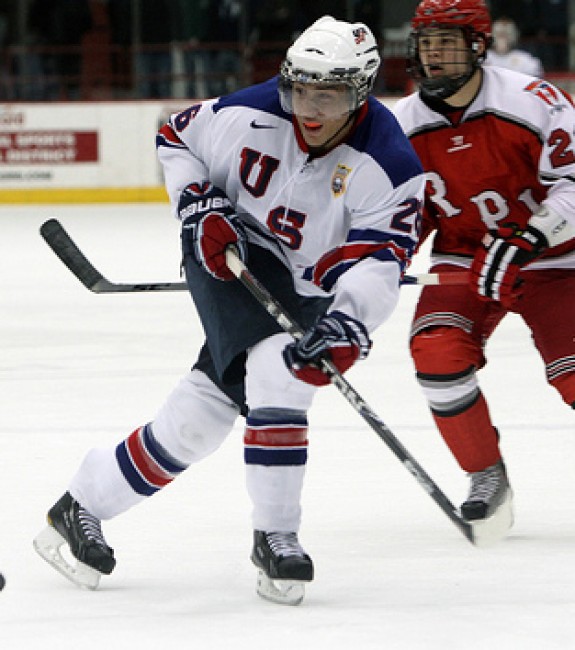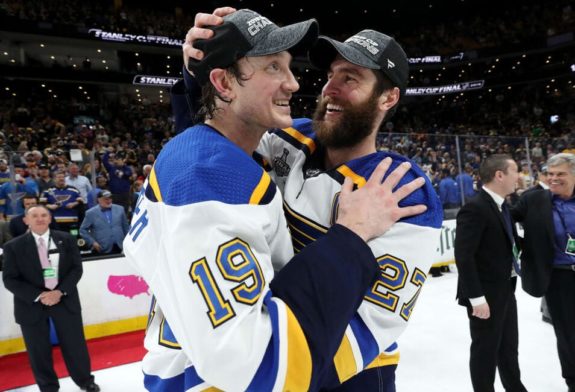The first players from the Medicine Hat Tigers to attend the World Juniors Championship was in 1975 with Greg Vaydik and Bryan Maxwell. Although it wasn’t an official tournament, the pair of draft-eligible prospects helped Canada claim their first silver medal at the under-20 level. Since then, 32 players from the Tigers have attended the event, spanning every era and representing half a dozen nations.
With such a rich history at the tournament, it’s no surprise that a few former Tigers were integral to their country’s success. Together they form an All-Star lineup that could rival any from a Canadian junior team.

However, the best players may not be those you’d expect. Both Lanny McDonald and Tom Lysiak never attended the esteemed competition as their junior days predated the tournament, and Trevor Linden’s only appearance was underwhelming, with just a single goal in a diminished role. It’s not always the future NHL stars – or even the top junior stars – who make the biggest impact at the World Juniors.
So, who is on the Tigers’ All-Time World Junior roster?
Center: Al Conroy
Al Conroy was not the biggest star, both figuratively and literally. At 5-foot-8, he was one of the smallest players on the Tigers. He was also never considered the team’s top star, despite scoring over 100 points in all but one of his four seasons with the team. He led the Tigers just once in scoring when he put up 41 goals and 138 points in 1984-85. Someone was always bigger and better than him.
But in 1986, Team Canada added him to their World Junior roster. He admittedly looked a bit out of place as an undrafted 20-year-old, joining top NHL prospects Shayne Corson, Joe Nieuwendyk, Scott Mellanby, Joe Murphy, and Luc Robitaille. Not much was expected from the junior veteran and he was likely added for depth.
But Conroy didn’t see it that way and he made sure his time on Team Canada counted. In seven games, he scored four goals and eight points, ranking seventh on the team to tie Robitaille. His efforts helped Canada tally the most goals in the tournament, but their 5-2-0 record wasn’t good enough to dethrone the undefeated Soviets. Canada took home a silver medal, but Conroy earned a deal with the Philadelphia Flyers, where he played parts of three seasons.
Left Wing: Tyler Ennis
Another small forward, at 5-foot-9, Tyler Ennis was known for his good speed and even better hands. He led the team in scoring in 2007-08 and 2008-09, putting up 91 and 85 points, respectively, and was selected in the first round in the 2008 Draft, 21st overall, by the Buffalo Sabres. He also was a two-time WHL All-Star and Most Sportsmanship Award recipient and helped the Tigers claim their fifth league title in 2007. It seemed like only a matter of time before he’d get a chance to play for Team Canada.
Ennis finally got his chance at the 2009 World Juniors, where he met up with John Tavares, P.K. Subban, Evander Kane, Jamie Benn, and Cody Hodgson. In the group stage, Canada was undefeated, brushing past the Czechs, Kazakhs, Germans, and even the Americans, outscoring their opponents 35 to 6. That gave them a bye into the playoffs, where they just snuck by the Russians to face Sweden in the final. But that, too, proved anticlimactic as the Canadians won handily 5-1 to claim the gold.
Ennis finished the tournament tied for fifth in team scoring with three goals and seven points with fellow WHL star Zach Boychuk and OHL defenseman Ryan Ellis. It was a solid performance from the undersized forward and it made an excellent impression on the Sabres, who brought him up to the NHL the following season. Ennis has since played 12 NHL seasons for five teams, scoring over 300 points. However, he also was the last Tiger to play for Team Canada at the U20 World Junior tournament.
Right Wing: Emerson Etem
It’s not surprising that most of the Tigers who played at the tournament joined Team Canada, but the next most-represented nation is the Czech Republic, not the Americans. Only two players have played for Team USA at the World Juniors, the first was Ryan Hollweg, who played in the 2002 tournament when he tied for second in scoring but had some penalty trouble with 33 minutes in just six games, and he went home medal-less.
Related: Canada Names All-WHL Leadership Group For 2021 WJC
The only other player to represent the Americans was Emerson Etem. He joined the Tigers in 2009-10 after a season with the United States U18 National Development Program and had a great rookie season in Medicine Hat, scoring 37 goals to lead all rookies, which convinced the Anaheim Ducks to take him 29th overall in the 2010 Draft.
He was even more dominant as a WHL sophomore, which was too much for Team USA to ignore, and they added him to their 2011 roster in a depth role. Although they were coming off a gold medal in 2010, the team stumbled against Canada in the playoffs and went home with a bronze.

Etem wasn’t all that impactful at the tournament, scoring just a single goal, but the Americans brought him back for the 2012 World Juniors, where he rejoined Jason Zucker to form the leadership core of the team. Etem was given an ‘A’ on his sweater and a bigger role. But the Americans didn’t fare quite as well. After thrashing Denmark 11-3 in their opening game, they struggled the rest of the way, falling to the Finns 4-1, the Czechs 5-2, and the Canadians, 3-2, missing the playoffs and forced to play in the relegation round.
Although they won easily, it was a major disappointment for the hockey powerhouse. It was Team USA’s worst finish since 1999 when they placed eighth. As for Etem, he finished with zero goals and four assists. He returned to the Tigers and led the league with 61 goals and earned his only WHL All-Star appearance. In the NHL, however, he was unable to find the same rhythm he had in junior or internationally. At 28 years old, he announced his retirement, after scoring just 46 points over 173 NHL games.
Defense: Jay Bouwmeester and Kris Russell
Jay Bouwmeester made history when he was selected to join Team Canada at the 2000 World Juniors, becoming just the fourth 16-year-old to make the team, following Wayne Gretzky, Bill Campbell, and Eric Lindros. Although he was held pointless, he helped the Canadians secure the bronze medal, by defeating the Americans 4-3 in the shootout.
Related: Top 5 Medicine Hat Tigers to Make it to the NHL
The lanky defender returned in 2001 with a bigger role. He thrived with the increased responsibility, notching two assists, but Canada failed to improve their record and they again finished with a bronze medal, defeating the Swedes 2-1 in overtime.
Bouwmeester returned for the third time in 2002, making history once again as just the fifth Canadian to play in three World Junior Championships, but there was extra pressure. The NHL Scouting Service ranked him as the top North American prospect for the upcoming draft and he was considered the top choice in the NHL draft . A strong tournament would cement him as the consensus first overall choice, but another disappointing finish would hurt his ranking.
The tournament went almost perfectly for Bouwmeester and Canada. They finished second in their pool behind Finland but cruised through the playoff round to the Final, where they prepared to face the powerful Russians. It was a hard-fought game – Canada came out on top early, but Russia scored three goals in the second to even things out. The game remained tied 4-4 until the dying minutes of the third when Anton Volchenkov put one past Pascal Leclaire to secure the victory.
Bouwmeester was selected to the tournament’s All-Star Team after leading all players in plus/minus, but when it came to the 2003 Draft, he fell to the Florida Panthers at the third spot (the top spot went to his Team Canada teammate, Rick Nash). He was eligible to return for the 2003 tournament – and would have been the first player to play in four tournaments – but the Panthers decided to keep him in the NHL. His inability to claim a gold medal didn’t hurt his career, though; over 17 seasons, he’s played over 1200 games and won the Stanley Cup with the St. Louis Blues in 2019.

Kris Russell, on the other hand, was almost the exact opposite of Bouwmeester. While Bouwmeester was the first-overall selection in the WHL Bantam Draft, Russell was an eighth-round pick. Bouwmeester was a first-round NHL pick and top-ranked prospect; Russell, a third-round pick, ranked 95th among North American skaters in 2005. And the 6-foot-3 Bouwmeester towered over the 5-foot-10 Russell.
But the two were both dominant with the Tigers and earned coveted spots on the Canadian World Junior Team. However, Russell had to wait until 2006 to make his first appearance when Canada was defending the gold medal for the first time since 1997. He had four points, including a goal in the semi-final against the Finns and an assist in the final against Russia. Russell returned in 2007 and was even better, scoring four goals and six points, two of which came in one game against the Slovaks, to lead all defensemen in goals.
With him, Canada won their third consecutive gold medal, for the second time. All of a sudden, Russell wasn’t all that underrated anymore. He made the Columbus Blue Jackets the following season, and though his NHL career hasn’t had the same success as his junior career, he’s beloved by the old-school hockey crowd for his dedication to blocking shots and playing solid defense.
Goalie: Marek Langhamer
An import selection by the Tigers in 2012, Marek Langhamer became the team’s starting goalie in 2013-14 after the departure of Cam Lanigan. Although he was never a dominant goalie, he was solid in Medicine Hat and earned a spot on the Czech World Junior team as the backup. The Czechs knew they were in for a tough tournament, thanks to being included in the same pool as Canada, the USA, and Slovakia, and they needed all the help they could get.
National team regular Daniel Dolejs was chosen to face the Americans in game one, but after a 5-1 loss, it was Langhamer who was given the start against the Canadians. Against Connor McDavid, Aaron Ekblad, Jonathan Drouin, and Sam Reinhart, there wasn’t much hope for victory, but Langhamer had other ideas. After three periods, the score was tied 4-4, with 29 shots apiece, and after a tough-fought over time, they were still tied. It then fell to their goalie to keep them in the game, and somehow, after facing Drouin, Nic Petan, and McDavid, it was the Czechs who came out on top.
Despite his 5-4 win against the Canadians, Langhamer didn’t win again in the 2014 tournament and the Team Czech Republic finished sixth. Still, he is the only Tigers goalie to earn a win at the World Juniors.
Surprisingly few goalies from the Tigers have gone to the World Juniors. Kelly Hrudey was unable to go when Hockey Canada sent a group from the OHL instead (representatives used to be league-specific), and Chris Osgood was left home in favour of Trevor Kidd, who won gold with Canada twice in 1990 and 1991. Langhamer’s time in the NHL didn’t last long, but he’ll always be remembered for his steal against Canada.
Who’s Next?
The Tigers didn’t have any representatives at the 2021 tournament, although Lukas Svejkovsky nearly made the American team before representing the Tigers at the Memorial E-Cup, which he won. Expect him to compete for a spot next year.
Cole Sillinger, a projected top pick for the 2021 NHL Draft, may earn a spot on Team Canada in 2022 or 2023. He had a great U17 tournament last season, scoring five goals in six games. Defenseman Dru Krebs could also make the team in the next couple of years, following in his older brother Payton’s footsteps who is on the 2021 Canadian roster.
If not them, however, then the team will have another representative soon enough. The Tigers are always a top team in the WHL and are excellent at developing talent. Whether it’s for Canada or another nation, the Tigers have been well represented at the tournament, and there are no signs that it will stop any time soon.